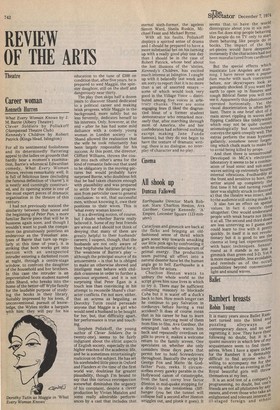Theatre
Career woman
Kenneth Hurren
What Every Woman Knows by J.
M. Barrie (Albery Theatre)
Clever Soldiers by Poliakoff (Hampstead Theatre Club) Kennedy's Children by Robert Patrick (Kings Head, Islington) For all its sentimental foolishness and its determinedly flattering appeal to the ladies on grounds that hardly bear a moment's examination, Barrie's whimsical Edwardian comedy, What Every Woman Knows, revives remarkably well. It is full of felicitous lines (including the famous definition of 'charm'), it is neatly and cunningly constructed, and its opening scene is one of the most expert pieces of dramatic organisation in the theatre of this century.
I had not previously noticed the similarity between that scene and the beginning of Peter Pan, a more familiar Barrie piece that will be in business again soon, and though I wouldn't want to push the comparison (as gratuitously pointless an endeavour as the 'Freudian' analyses of Barrie that turn up regularly at this time of year), it is striking that both works get into motion with an unexpected intruder entering a darkened room at night, through a centre-stage window, to confront the daughter of the household and her brothers. In this case the intruder is an impoverished Scots student named John Shand, who breaks into the home of the better-off Wylie family for the laudable purpose of studying the books in their library. Suitably impressed by his keen, if unconventional, pursuit of knowledge, the Wylies strike a bargain with him: they will pay for his
education to the tune of £300 on condition that, after five years, he is prepared to wed Maggie, the spinster daughter, still on the shelf and dangerously near thirty.
The play then skips half a dozen years to discover Shand dedicated to a political career and making brisk progress, while Maggie in the background, more subtly but no less fervently, dedicates herself to his interests. Only, however, at the end — after he has had some mild dalliance with a Comely young woman in London society — is Shand allowed the realisation that the wife he took reluctantly has been largely responsible for his success. At this point, the director, Clifford Williams, throws the couple into each other's arms for the kind of romantic fade-out that used to be obligatory in the moving-pictures but would probably have surprised Barrie, who doubtless felt that he had taken chances enough with plausibility and was prepared to settle for the dubious progression from particular case to general conclusion: to wit, that successful men, without knowing it, owe their positions to their wives. This is 'what every woman knows'.
It is a diverting notion, of course, but I doubt whether Barrie really believed it. Some of my best friends are wives and I should not think of denying that many of them are greatly helpful to their husbands' careers; I suspect, though, that the husbands are not only aware of their helpfulness but grateful for it. The weakness of Barrie's play — although the principal source of its amusements — is that he is obliged to make an otherwise shrewd and intelligent man behave with childish crassness in order to further a specious argument, and it is not surprising that Peter Egan is a touch less than convincing in his attempt to reconcile Shand's character conflicts. I'm not sure, either, that an actress as beguiling as Dorothy Tutin could persuade anyone that Maggie is a girl who would need a husband to be bought for her, but, that difficulty apart, her performance is true and touching.
Stephen Poliakoff, the young author of Clever Soldiers (he is twenty-one), seems to be fairly indignant about the elitist aspects of Englishsociety, especially in the higher reaches of the academic life, and he is sometimes entertainingly malicious on the subject. He has set his soreheaded little piece in Oxford and Flanders at the time of the first world war, doubtless for greater plausibility, though I'm bound to say that this curious retrospection somewhat diminishes the urgency of his complaint, despite a clever production by Vivian Matalon and some really admirable performances by a cast that includes that
eternal sixth-former, the ageless Simon Ward, Sheila Ruskin, Michael Feast and Michael Byrne.
With all his faults, Poliakoff displays a spirited sense of drama and I should be prepared to have a more substantial bet on his turning up with a really good play one day than I should be in the case of Robert Patrick, whose beef about the lost illusions of the 'sixties, Kennedy's Children, has excited much interest at Islington. I caught up with it belatedly last week and am sorry to report that it is no more than a set of assorted essays — some of which would look very good in the Village Voice — distributed among five voices in arbitrary chunks. There are some engaging lines (I liked the disgruntled bleat of a former student demonstrator who remarked morosely that, after marching through most of America, she and her confederates had achieved nothing except making Jane Fonda famous), but they do not begin to have the texture of dramatic writing; there is no dialogue, no interplay of character and no play.


































 Previous page
Previous page